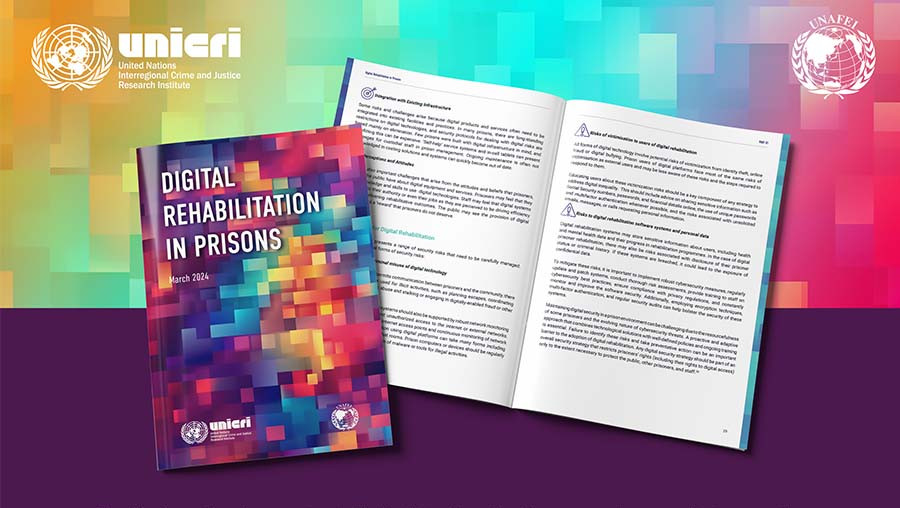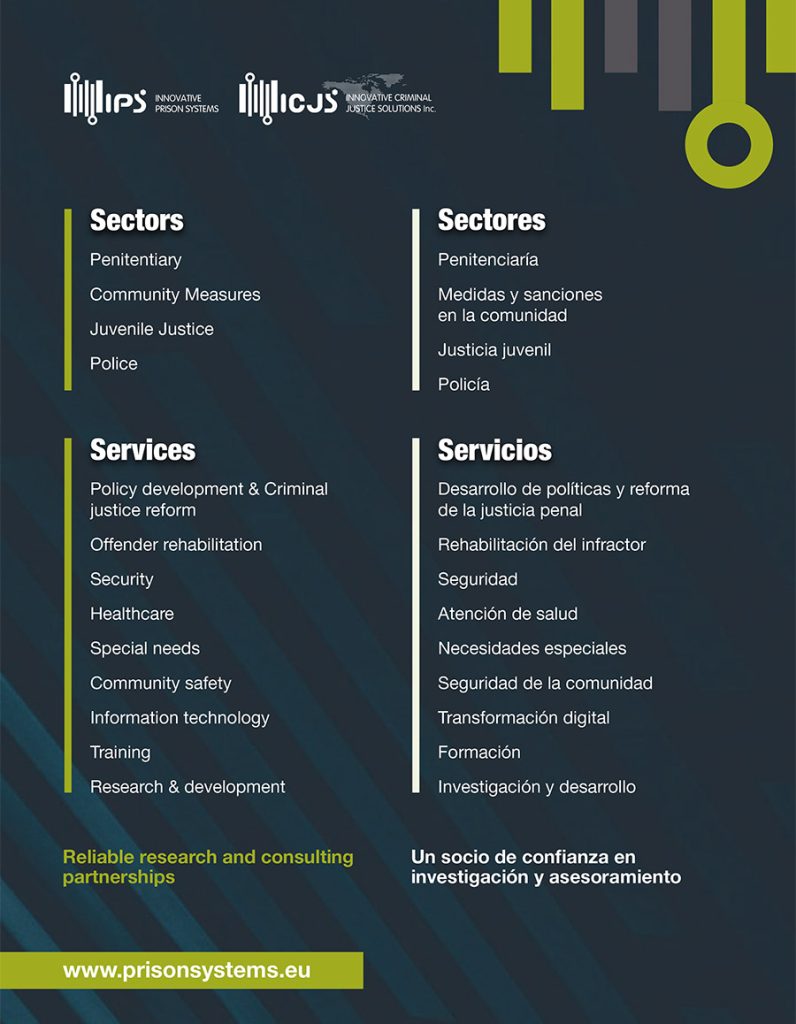Article
Mana Yamamoto, Matthew Burnett Stuart & Alice Roberti
Aligned with the United Nations (UN) Standard Minimum Rules for the Treatment of Prisoners (the Nelson Mandela Rules), the UN Rules for the Treatment of Women Prisoners and Non-custodial Measures for Women Offenders (the Bangkok Rules), numerous jurisdictions have been exploring effective approaches in the context of education, mental health, vocational training and employment to facilitate the successful reintegration into society of people in prison.
Throughout these efforts, prison authorities face various implementation challenges. These include limited resources, an adverse prison environment, and the difficulty of simulating real-life situations or ensuring regular contact with family and access to community support.
Digital technologies have the potential to overcome such challenges. In recent years, the pace of development in introducing the use of technologies in prisoners’ rehabilitation has been increasing exponentially.
Digital rehabilitation in prisons includes the provision of services and support to people in custody or transitioning out of prison to enable them to live fulfilling lives back in the community. For example, in behavioral change programs, technology can help prisoners prepare for the challenges they may face upon release.
This can be achieved by allowing them to visualize, participate and reflect on real-life scenarios, learn new skills, and apply and practice positive alternatives. However, the systematic collection and evaluation of rehabilitation models incorporating digital interventions and the development of policy, legal and ethical frameworks to guide and regulate their use is proceeding more slowly.
UNICRI’s Project and Research Report
In this context, The United Nations Interregional Crime and Justice Research Institute (UNICRI), with the support of the United Nations Asia and Far East Institute for the Prevention of Crime and the Treatment of Offenders (UNAFEI) and the Government of Japan, have recently launched a project exploring the potential advantages of innovative technologies for prisoner rehabilitation.
This initiative aims to support and facilitate the development of comprehensive digital rehabilitation strategies that comply with human rights principles and effectively address the unique challenges faced by prisoners.
The research efforts of the first year of this project resulted in a report titled “Digital Rehabilitation in Prisons”, which was published in March 2024.
This report provides guidance across three broad areas:
(i) The ethical principles that should guide the use of digital rehabilitation in prisons;
(ii) Planning for the development, implementation, and continuing provision of digital resources to support rehabilitation; and
(iii) The applications and systems that can be used to support rehabilitation, reduce reoffending, and promote desistance.
The document aims to assist policymakers and practitioners in understanding how to leverage technologies to effectively and ethically support prisoners’ rehabilitation while examining potential risks and benefits. Indeed, digital rehabilitation could bring some important benefits, including more accessible, enriching, flexible, and cost-effective service delivery, but it also poses significant ethical, technical, and operational challenges.

Developing a Digital Rehabilitation Strategy
Digital technologies have the potential to significantly reshape the way that prison services provide rehabilitation to people in prison. However, there are profound challenges involved in this transformation.
The ad hoc adoption of programmes and technologies is potentially problematic due to the rapid pace of development, difficulties in designing and integrating digital interventions, the lack of sound evaluation data, and the underdeveloped state of regulatory frameworks.
UNICRI’s report found that a key challenge facing prisons is not the technological problem of implementing digital methods and processes but rather the integration of these platforms into the values, prison culture methodologies, workflows, and operations of the sector. This requires the creation of equality and inclusion practices, engagement, and ownership amongst users.
Consequently, coherent and strategic planning is essential. Engaging with some fundamental questions about digital transformation is critical to properly understanding digital rehabilitation and deciding how to design, adapt, and implement its applications and platforms to meet the needs of people in prisons. Two primary questions must be considered when developing a digital rehabilitation strategy.
The first is, “What is the scope of this strategy, and how does it relate to our goals and priorities, level of digital readiness, and the resources that are available?”. To help practitioners and policymakers answer this question, UNICRI’s report sets out three digital rehabilitation pathways representing different approaches to integrating digital technology into rehabilitation.
The second is “How do we get there?” To facilitate this process, the document sets out a framework for the development of digital rehabilitation strategies that addresses the policy and technology issues involved and assesses the potential for delivering rehabilitation services digitally. This framework is not a ‘how-to’ guide but rather a set of issues and principles to consider when developing a digital strategy.
The extent to which services can transform with digital technologies is a question of readiness – the capacity and capability to work digitally. In the report, UNICRI examines the digital technologies that have been used for rehabilitation, the distinction between different forms of digital applications and platforms, the developers and providers of digital rehabilitation products, and the importance of user engagement in the digital domain.
Methodology of the report: Expert Consultations and Case Examples
A key element of the project methodology was the engagement with a diverse range of experts on this topic, with the objective of collecting and analysing a comprehensive set of examples of the use of digital rehabilitation in different contexts worldwide.
To this end, Professor Stuart Ross (University of Melbourne) and Dr. Victoria Knight (De Montfort University), who wrote the report under the guidance of UNICRI, liaised with an Expert Group of 19 volunteer professionals to explore their perspectives and practices in relation to digital rehabilitation.
The group of experts included practitioners from a range of relevant areas, policy makers, industry partners and developers, human rights leaders, and people with lived experience of prisons.
Based on one-on-one interviews with these volunteer experts, 11 case examples were identified to illustrate different themes and offer readers insights into the initiatives’ objectives and achievements. Overall it is evident that the development of rehabilitation in prisons using digital resources and tool doesn’t not follow a single pathway.
For example, the case examples include, for instance, Finland’s Smart Prison concept, which leverages digital services like personal laptops to create a rehabilitative learning environment and emphasizes improving prisoners’ rights through versatile digital learning tools, including limited internet access and platforms like Moodle.
Another example comes from the Corrective Services New South Wales in Australia, which launched a strategy to enhance offender rehabilitation by introducing in-cell tablet technology and online group programmes. The report also illustrates a case study from Thailand, where the Hygiene Street Food project assists prisoners in establishing street food businesses post-release. This involves integrating digital literacy training and utilizing mobile apps for business support.
Another case study is from Argentina, where the Civil Association of Families of Individuals Detained in Federal Prison (ACIFaD) advocates for improved communication between incarcerated parents and their children through web-based tools, underscoring the importance of multi-agency collaboration in facilitating family contact in prisons.
Key Take-Aways and Next Steps of UNICRI’s Project
To conclude, below are some of the key over-arching ideas that should be noted in the process of developing a digital rehabilitation strategy:
– There is no single approach to introducing digital resources and services into prisons. A one-size-fits-all blueprint for development and implementation cannot exist, and a strategy appropriate for one jurisdiction cannot simply be exported to another.
– Digital rehabilitation needs to be based on clearly stated ethical principles and with an understanding that digital initiatives can do good but also have the potential to create or exacerbate various forms of digital inequality and harm1.
– Effective rehabilitation requires an understanding of the needs of the people to ensure that the services and resources delivered are best suited to assist people on their journey to desistance and to adopt fulfilling and socially integrated lifestyles.
– Rehabilitation needs should determine the tools and systems that are selected and the technology solution that is chosen to deliver them. Decisions should be driven by human needs rather than the enticement and promise of technology.
– Digital rehabilitation is a rapidly developing area, and there are few proven tools and services. Any digital rehabilitation strategy must include systems to evaluate the results of tools and systems that are implemented, and processes to refine policies, technology and service systems based on this knowledge. Adopting an evaluative culture will ensure that user needs are met while ensuring ethical rigour.
Based on the research efforts of the first year of UNICRI’s initiative, the next phase will focus on supporting the development of digital rehabilitation strategies in two pilot countries – Namibia and Thailand.
This innovative project aims to enhance the capabilities of these countries in implementing digital solutions within their criminal justice systems to improve the outcomes of prisoners’ rehabilitation. This initiative aims to directly benefit the pilot countries and serve as a model for other countries looking to integrate digital solutions into their rehabilitation strategies.
For details, feel free to check out the report on UNICRI website.
1 E-government Survey 2022: The Future of Digital Government. United Nations Department of Economic and Social Affairs.

Mana Yamamoto is a Research Expert at UNICRI, where she conducts research and implements technical assistance projects on the rehabilitation and reintegration of offenders. She has over 20 years of experience in the field of prison management and reform, both in Japan and internationally, as a correctional psychologist with a PhD. in psychology. Yamamoto previously worked for the Ministry of Justice in Japan, where she was responsible for the management of the prison rehabilitation programmes. Additionally, she served as a professor at the United Nations Asia and Far East Institute for the Prevention of Crime and the Treatment of Offenders (UNAFEI), overseeing international training courses and providing technical assistance to developing countries.

Matthew Burnett Stuart is an Associate Expert at UNICRI, where he manages research initiatives and projects focused on enhancing the rule of law and preventing violent extremism in fragile and conflict-affected states. His current role includes co-managing UNICRI’s project on digital rehabilitation in prisons, which seeks to harness technology to improve rehabilitation processes for incarcerated individuals. Before joining UNICRI, Matthew worked on emergency and resilience programming in Yemen, Iraq, and Liberia. He holds an MA in Human Rights Law from the School of Oriental and African Studies (SOAS) at the University of London.

Alice Roberti is a Fellow within the Counter-Terrorism Unit of UNICRI, where she supports initiatives aimed at preventing violent extremism, with a focus on the Sahel. Before joining UNICRI, she worked in the context of prisoners’ rehabilitation and resettlement in the UK, coordinating mentoring and capacity-building programs. Alice holds an MSc in Criminal Justice Policy from the London School of Economics and an LLM in Transnational Crime and Justice from the UN-mandated University for Peace.



